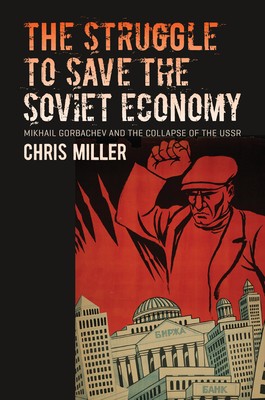
- We will send in 10–14 business days.
- Author: Chris Miller
- Publisher: University of North Carolina Press
- Year: 2020
- Pages: 264
- ISBN-10: 1469661535
- ISBN-13: 9781469661537
- Format: 15.6 x 23.4 x 1.5 cm, minkšti viršeliai
- Language: English
- SAVE -10% with code: EXTRA
Reviews
Description
For half a century the Soviet economy was inefficient but stable. In the late 1980s, to the surprise of nearly everyone, it suddenly collapsed. Why did this happen? And what role did Soviet leader Mikhail Gorbachev's economic reforms play in the country's dissolution? In this groundbreaking study, Chris Miller shows that Gorbachev and his allies tried to learn from the great success story of transitions from socialism to capitalism, Deng Xiaoping's China. Why, then, were efforts to revitalize Soviet socialism so much less successful than in China?
Making use of never-before-studied documents from the Soviet politburo and other archives, Miller argues that the difference between the Soviet Union and China--and the ultimate cause of the Soviet collapse--was not economics but politics. The Soviet government was divided by bitter conflict, and Gorbachev, the ostensible Soviet autocrat, was unable to outmaneuver the interest groups that were threatened by his economic reforms. Miller's analysis settles long-standing debates about the politics and economics of perestroika, transforming our understanding of the causes of the Soviet Union's rapid demise.
EXTRA 10 % discount with code: EXTRA
The promotion ends in 23d.17:52:48
The discount code is valid when purchasing from 10 €. Discounts do not stack.
- Author: Chris Miller
- Publisher: University of North Carolina Press
- Year: 2020
- Pages: 264
- ISBN-10: 1469661535
- ISBN-13: 9781469661537
- Format: 15.6 x 23.4 x 1.5 cm, minkšti viršeliai
- Language: English English
For half a century the Soviet economy was inefficient but stable. In the late 1980s, to the surprise of nearly everyone, it suddenly collapsed. Why did this happen? And what role did Soviet leader Mikhail Gorbachev's economic reforms play in the country's dissolution? In this groundbreaking study, Chris Miller shows that Gorbachev and his allies tried to learn from the great success story of transitions from socialism to capitalism, Deng Xiaoping's China. Why, then, were efforts to revitalize Soviet socialism so much less successful than in China?
Making use of never-before-studied documents from the Soviet politburo and other archives, Miller argues that the difference between the Soviet Union and China--and the ultimate cause of the Soviet collapse--was not economics but politics. The Soviet government was divided by bitter conflict, and Gorbachev, the ostensible Soviet autocrat, was unable to outmaneuver the interest groups that were threatened by his economic reforms. Miller's analysis settles long-standing debates about the politics and economics of perestroika, transforming our understanding of the causes of the Soviet Union's rapid demise.


Reviews